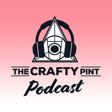
Selling Beer & Building Brands featuring Tom Delmont
Few people in Australia have put as much craft beer into as many venues as Tom Delmont.
He was Mountain Goat's first ever sales rep – forcing his way into the role and leaving the world of entomology behind – before moving on from the Melbourne icons when they sold to Asahi, later founding IPA-centric brewing company Fixation with the founders of Stone & Wood.
He left Fixation a few weeks prior to recording this show, joining carbon accounting platform Zevero, and on the podcast shares stories from his colourful career in beer as well as insights into the art of selling beer and building beer brands.
Anyone that's met him over his two decades in beer will know he's a great storyteller and has a genuine love for good beer that surpasses pretty much everyone else on the planet.
As an aside, hours after we recorded the show, both he then we learned that Lion had taken the decision to close the Incubator – Fixation's brewpub in Melbourne – hence the late insert into the show. The brand and IPAs will live on, however.
Links referenced in or relevant to the show:
Froth Town 2024: https://www.froth.town/
Bendigo On The Hop 2024: https://www.bendigobeer.com/both-2024
Lord Nelson sold to Laundy Hotels: https://craftypint.com/news/3545/laundy-hotels-buy-the-lord-nelson
Burnley Brewing to close their Richmond taproom: https://craftypint.com/news/3548/burnley-brewing-to-close-their-richmond-taproom
Zevero launches in Australia: https://craftypint.com/news/3539/zeveros-mission-to-help-breweries-cut-emissions
NB: around 47 minutes in, you might pick up a slight buzzing sound coming and going. We're not sure what's caused this given we didn't pause or restart the recording before that point, but we'll attempt to find out what caused it before the next show...
